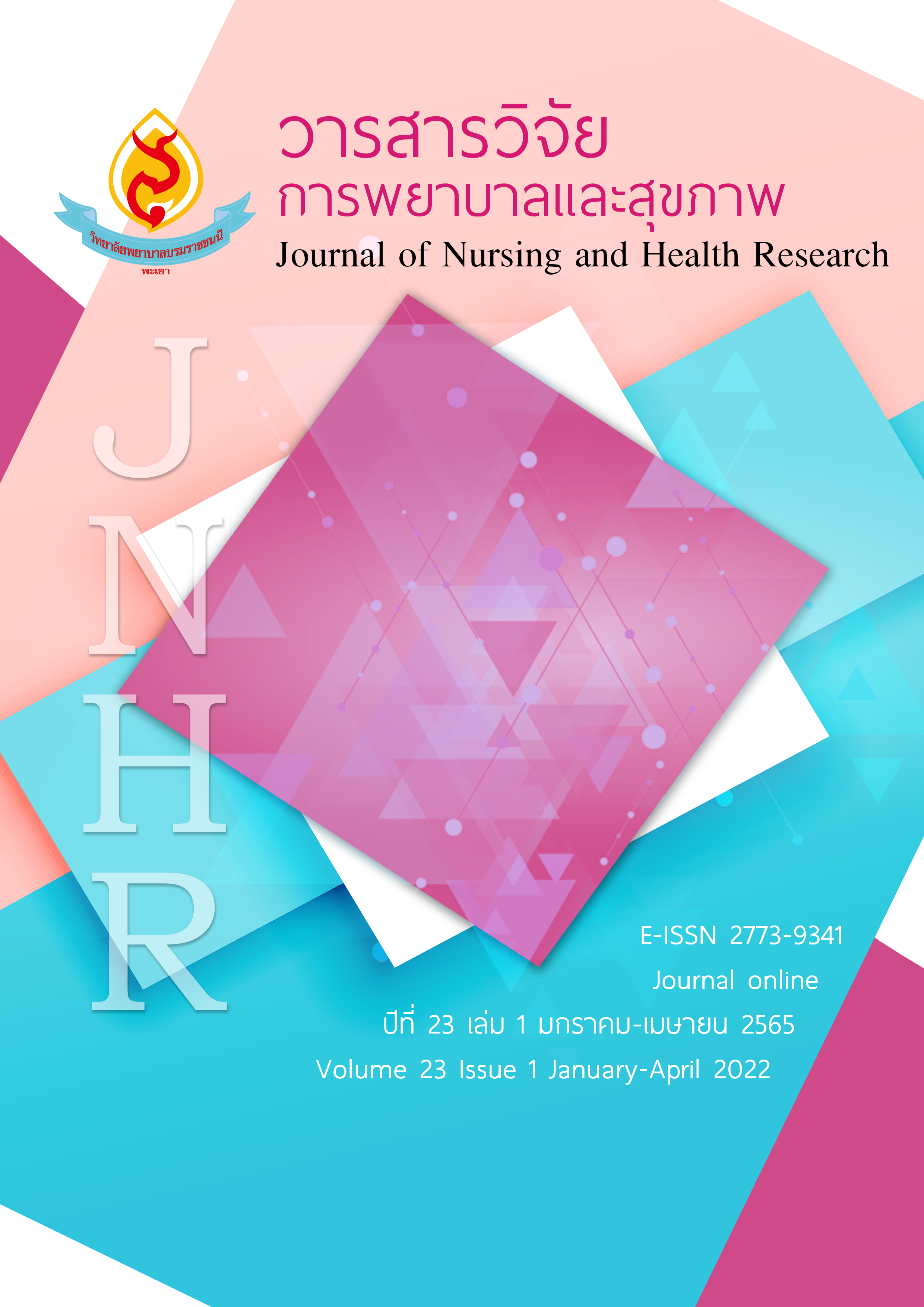ผลกระทบและการปรับตัวของผู้สัมผัสที่มีความเสี่ยงสูงต่อโรคโควิด-19 ที่ต้องกักตัวอยู่ที่บ้าน: การศึกษาเชิงคุณภาพ
คำสำคัญ:
ผู้ถูกกักตัว, ผลกระทบ, โรคโควิด -19, การปรับตัวบทคัดย่อ
การกักตัวเป็นวิธีการหนึ่งที่มีประสิทธิภาพในการป้องกันโรคระบาด ซึ่งอาจส่งผลกระทบต่อบุคคลที่ถูกกักตัวทั้งในทางลบหรือทางบวก การวิจัยเชิงคุณภาพครั้งนี้เป็นรูปแบบเชิงพรรณนา (qualitative descriptive research) ตามแนวคิดของแซนเดโลว์สกี (Sandelowski, 2000) มีวัตถุประสงค์เพื่ออธิบายผลกระทบและการปรับตัวของผู้สัมผัสที่มีความเสี่ยงสูงต่อโรคโควิด -19 ที่ต้องกักตัวอยู่ที่บ้าน ผู้ร่วมวิจัย (participants) คือ ผู้สัมผัสที่มีความเสี่ยงสูงต่อโรคโควิด -19 ที่ต้องกักตัวอยู่ที่บ้านที่มีคุณสมบัติตามเกณฑ์และคัดเลือกแบบเจาะจง จำนวน 15 ราย เก็บรวบรวมข้อมูลโดยการสัมภาษณ์เจาะลึก วิเคราะห์ข้อมูลด้วยวิธีการวิเคราะห์เนื้อหา (content analysis) ผลวิจัยพบว่า ผลกระทบเกิดขึ้นทั้งหมด 4 ด้าน ได้แก่ ผลกระทบด้านสุขภาพ ผลกระทบด้านจิตใจ ผลกระทบทางสังคม และผลกระทบภายในครอบครัว การปรับตัว มี 4 ด้าน ได้แก่ การปรับตัวทางด้านร่างกาย จิตใจ สังคมและครอบครัว จากผลการวิจัย จึงควรมีการให้ความรู้เกี่ยวกับโรค และข้อมูลเกี่ยวกับการปฏิบัติตัวขณะถูกกักกัน การช่วยเหลือขณะและเมื่อออกจากการกักกัน การให้ข้อมูลของโรคอย่างต่อเนื่องและถูกต้อง จะทำให้ลดความขัดแย้งที่เกิดขึ้นในชุมชนลงได้ และควรมีการศึกษาพัฒนาวิธีการลดความขัดแย้งในชุมชนในกรณีเกิดโรคระบาดใหม่
เอกสารอ้างอิง
กรมควบคุมโรค กระทรวงสาธารณสุข. (2563ก). แนวทางการเฝ้าระวังและสอบสวนโรคไวรัสโคโรนา 19 (coronavirus disease 2019: covid-19). สืบค้นเมื่อ 15 เมษายน 2563, จาก https://ddc.moph.go.th/viralpneumonia/file/guide lines/ G35.pdf
กรมควบคุมโรค กระทรวงสาธารณสุข. (2563ข). แนวทางการบริหารจัดการ กรณีแยกกักเพื่อสังเกตอาการ(quarantine). สืบค้นเมื่อ 15 เมษายน 2563, จาก https://www.skho.moph.go.th/eoc/?page_id=769
กรมควบคุมโรค กระทรวงสาธารณสุข. (2563ค). หลักเกณฑ์ลักษณะ และแนวทางจัดการสถานที่ควบคุมเพื่อสังเกตการเริ่มป่วย (quarantine) กรณีผู้เดินทางจำนวนมากกลับจากพื้นที่เสี่ยงสูง. สืบค้นเมื่อ15 เมษายน 2563 , จาก https://ddc.moph.go.th/viralpneumonia/file/g_other/G_other_01_2.pdf
กรมควบคุมโรค กระทรวงสาธารณสุข. (2563ง). สถานที่ชุมนุมที่มีการประกาศให้ผู้เกี่ยวข้องเฝ้าระวังอาการตนเอง. สืบค้นเมื่อ 15 เมษายน 2563, จาก https://twitter.com/ddc_riskcom/
กรมสุขภาพจิต (2563). ระวังโรคระบาดทางจิต (emotional contagion) ในช่วงวิกฤตโควิด -19. สืบค้นเมื่อ 3 สิงหาคม 2563, จาก https://www.dmh.go.th/news-dmh/view.asp?id=30286
กระทรวงเกษตรและสหกรณ์. (2563). มาตรการเยียวยาเกษตรกรจากสถานการณ์ covid-19. สืบค้นเมื่อ 9 กันยายน 2563, จาก https://www.moac.go.th/.
ณัฐฐา กีนะพันธ์. (2563). ยูนิเซฟชี้เด็กเผชิญความเสี่ยงเพิ่มขึ้นด้านความรุนแรง การถูกทอดทิ้งและ การถูกแสวงประโยชน์ ในช่วงการควบคุมการแพร่ระบาดของโควิด -19. สืบค้นเมื่อวันที่ 15 เมษายน 2563, จากhttps://www.unicef.org/thailand/th/press-releases
ไทยรัฐ. (2563). กักตัวเครียดโดดตึกสยองข่าวทั่วไทย. สืบค้นเมื่อ 15 เมษายน 2563, จาก https://www.thairath.co.th/news/local/central/1819904
บุญวรา สุมะโน เจนพึ่งพร. (2563). ระวังความรุนแรงในโรคระบาด เมื่อ“บ้าน”อาจ ไม่ใช่ที่ปลอดภัยสำหรับทุกคน. สืบค้นเมื่อ 15 เมษายน 2563, จาก https://tdri.or.th/2020/04/domestic-violence-victims-during-covid19
ประพิมพันธ์ เป็นสุขพร้อม และประทุม ฤกษ์กลาง. (2561) . The effects of dharma information seeking behavior through social media on stress reduction and increasing happiness of working age population in Bangkok”. สืบค้นเมื่อ 7 ก.ค. 2564, จาก https://so03.tci-thaijo.org/index. php/Humanties-up/article/view/196644
มัณฑนา วิเทศสนธิ, เกรียงไกร อรุโณทยานันท์, และอรรถวิทย์ อุปโยคิน. (2564). การวิเคราะห์เชิงเปรียบเทียบการใช้บริการจัดส่งอาหารตามต้องการแบบออนไลน์ก่อนและหลังการระบาดใหญ่ของไวรัสโคโรนา 2019. สืบค้นเมื่อ 7 กค 2564, จากhttps://www.conference.thaince.org/index.php/ncce26/article/ view/892/617
ศูนย์ต่อต้านข่าวปลอมประเทศไทย. (2563). codid -19 เตือนอย่าแชร์ข่าวปลอม ระวังอย่าหลงเชื่อ กลุ่มแอบอ้าง. สืบค้นเมื่อ 15 เมษายน 2563, จาก https://www.antifakenewscenter.com/tag
สมาคมโภชนาการเพื่อกีฬาและสุขภาพ. (2563). แนะแนวทางปฏิบัติในช่วงถูกกักตัว 14 วันป้องกันแพร่เชื้อโควิด -19. สืบค้นเมื่อ 15 เมษายน 2563, จากhttps://www.posttoday.com/social/general/618530
สำนักงานสาธารณสุขจังหวัดเชียงราย. (2563). ร่วมด้วยช่วยกัน.ฝ่าฟันโควิด19. สืบค้นเมื่อ 15 เมษาย2563, จากhttps://www.facebook.com/SanaknganSatharnsukhCanghwadCheiyngray?fref=ts
สำนักส่งเสริมการเคารพสิทธิมนุษยชน. (2563). ข้อมูลการดำเนินงานของ กสม. เกี่ยวกับการคุ้มครองและส่งเสริมสิทธิของสตรีและเด็กหญิงในช่วงสถานการณ์การแพร่ระบาดของโรคโควิด 19. สืบค้นเมื่อ15 พฤษภาคม 2563, จาก http://docs.nhrc.or.th/uploads/62676-465.pdf
Asmundson, G. J. G., Paluszek, M. M., Landry, C. A., Rachor, G. S., McKay, D., & Taylor, S. (2020). Do pre-existing anxiety-related and mood disorders differentially impact covid -19 stress responses and coping? Journal of Anxiety Disorders, 74(2020) 102271 doi: 10.1016/j.janxdis.2020.102271
Bank, S. A. (2015). Social Isolation can kill you. Retrieved August 20, 2020, from https://www. psychology today.com/us/blog/wired-love/201511/social-isolation-can-kill-you.
Banschick, M. (2020). How to manage the psychological effects of quarantine how quarantine affects people and what we can do. Retrieved August 5, 2020, from https://www. psychologytoday.com/us/blog/the-intelligent-divorce/202003/how-manage-the-psychological-effects-quarantine
Caputi, T. L. (2020). Lonely in lockdown? Retrieved Aug 5, 2020, from https://www.psychology today.com/us/blog/behavioral-health matters/202004/lonely-in-lockdownin-lockdown
Center for Disease Control and Prevention. (2020a). Reducing stigma. Retrieved Aug 5, 2020, from https://www.cdc.gov/coronavirus/2019-ncov/daily-life-coping/reducing-stigma.html
Center for Disease Control and Prevention. (2020b). Coping with stress. Retrieved Sep 5, 2020, from https://www.cdc.gov/coronavirus/2019-ncov/daily-life coping/managing-stress-anxiety.html# recovering-ending-isolation
Cherry, K. (2020). How to cope with quarantine. Retrieved Aug 5, 2020, from https://www.verywellmind.com/protect-your-mental-health-during-quarantine-4799766
Giallonardo, V., Sampogna, G., Vecchio, V. D., Luciano, M., Albert, U., Carmassi, C., … Fiorillo, A. (2020). The Impact of quarantine and physical distancing following covid -19 on mental health: study protocol of a multicentric Italian population trial. Frontiers in Psychiatry. 11: 533 doi: 10.3389/fpsyt.2020.00533
Jeong, H., Yim, H. W., Song, Y. J., Ki, M., Min, J., Cho, J.,…Chae, J. (2016). Mental health status of people isolated due to middle- east respiratory syndrome. Epidemiology and Health, 38, e2016048 https://doi.org/10.4178/epih.e2016048
Johal, S. S. (2009). Psychosocial impacts of quarantine during disease outbreaks and interventions that may help to relieve strain. Journal of the New Zealand Medical Association, 22 (1296), 53-58 Retrieved August 21, 2020, https://mro.massey.ac.nz/bitstream/handle/10179/9559/Psychosocial-impacts-of-quarantine.pdf
Lambert, V. A. & Lambert, C. E. (2012). Qualitative descriptive research: an acceptable design. Pacific Rim International Journal of Nursing Research, 16(4), 255-256 https://he02.tci-thaijo.org/index.php/PRIJNR/article/view/ 5805/5064
Mattioli, A. V., Nasi, M., Cocchi, C. & Farinetti, A. (2020). Covid-19 outbreak: impact of the quarantine-induced stress on cardiovascular disease risk burden. Future Cardiology, 10.2217/fca-2020-0055. doi: 10.2217/fca-2020-0055
McKay, D. (2020 ). Covid -19 stress and substance use: current issues and future preparations. Journal of Anxiety Disorder, 74: 102274. Retrieved Aug 21, 2020, from https://www.ncbi.nlm.nih.gov/pmc/articles/PMC7371588/ pdf/ main.pdf
Meo, S. A., Abukhalaf, A. A., Aloma, A. A., Sattar, K. & Klonoff, D. C. (2020). Covid -19 pandemic: impact of quarantine on medical students’ mental wellbeing and learning behaviors. Pakistan Journal of Medical Science, 36(COVID19-S4): S43–S48. doi: 10.12669/pjms.36.COVID19-S4.2809
Mertens, G., Gerritsen, L., Duijndam, S., Salemink, E., & Engelhard, I. M. (2020). Fear of the coronavirus (covid -19): predictors in an online study conducted in March 2020. Journal of Anxiety Disorders, 74: 102258. doi: 10.1016/j.janxdis.2020.102258
Naseem, Z & Khalid, R. (2010). Positive thinking in coping with stress and health outcomes: literature review. Journal of Research and Reflections in Education, 4(1), 42 -61 Retrieved August 19, 2020, from http://citeseerx.ist.psu.edu/viewdoc/ download?doi=10.1.1.1078.6530&rep=rep1&type=pdf
Parodi, I. C., Poeta, M. G., Assini, A., Schirinzi, E. & Sette, P. D. (2020). Impact of quarantine due to covid infection on migraine: a survey in Genova, Italy. Neurological Sciences, 41(8):2025-2027. doi: 10.1007/s10072-020-04543-x
Philip, A. M. & Paul, S. S. (2002). The origin of quarantine. Clinical Infectious Diseases, 15(9):1071-1072. Retrieved April 15, 2020, from https://academic.oup.com/cid/article/35/9/1071/330421
Sandelowski, M. (2000). Focus on research methods whatever happened to qualitative description? Retrieved Aug 19, 2020, from https://onlinelibrary.wiley.com/doi/epdf/ 10.1002/1098-240X%28200008%2923%3A4%3C334%3A%3AAID-NUR9%3E3.0.CO%3B2-G
World Health Organization. (2020). Social stigma associated with codid -19. Retrieved August 5, 2020, fromhttps://www.who.int/docs/default- source/coronaviruse/ covid19-stigma-guide.pdf?sfvrsn=226180f4_2
ดาวน์โหลด
เผยแพร่แล้ว
รูปแบบการอ้างอิง
ฉบับ
ประเภทบทความ
สัญญาอนุญาต
ลิขสิทธิ์ (c) 2022 วารสารวิจัยการพยาบาลและสุขภาพ

อนุญาตภายใต้เงื่อนไข Creative Commons Attribution-NonCommercial-NoDerivatives 4.0 International License.



